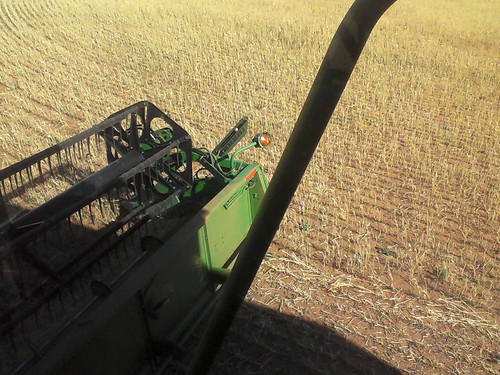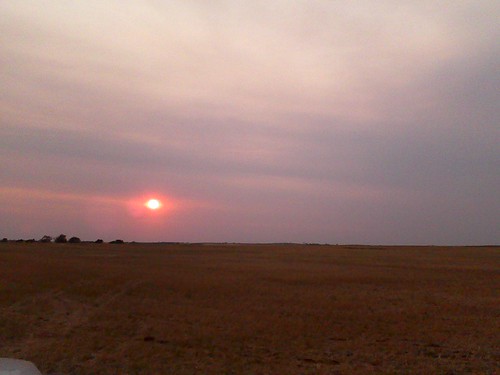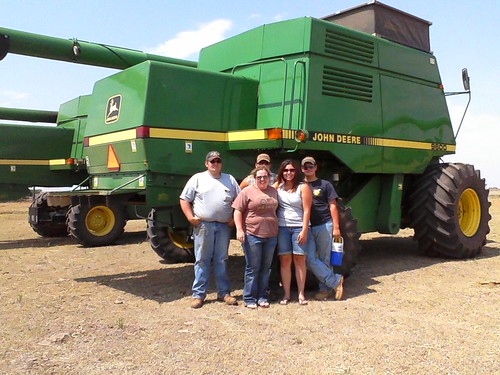08 Jun Emma: Crossin’ off Elk City and Cleanin’ Up
 The Misener crew has crossed Elk City, Okla., off the harvest list as of Tuesday. As I mentioned in my last post,wrapping up at home is bittersweet. This is when we leave and won’t be back until mid November or December. Many people ask how we’re able to do it and I just have to say that this lifestyle is not for everyone. It’s our way of life and what we do.
The Misener crew has crossed Elk City, Okla., off the harvest list as of Tuesday. As I mentioned in my last post,wrapping up at home is bittersweet. This is when we leave and won’t be back until mid November or December. Many people ask how we’re able to do it and I just have to say that this lifestyle is not for everyone. It’s our way of life and what we do.
My family really has two homes. We have Elk City where we have our home base and this is where we repair and store all of the machinery when it’s not in use. Our other home is a 30 foot trailer. We live about half of the year in our trailer and it makes our family close. We have to be or it wouldn’t work like it does. I’m proud that I’m comfortable to live that close to my family because I’m fortunate to have such a great family. It doesn’t feel like it’s half a year, but I suppose some harvesters would beg to differ.
While the guys finished up the last of the wheat harvest I took Abby to the airport. I have to say I already miss her. It has been three years since I met Abby. She applied to come on harvest and since then we’ve really become inseparable. If it weren’t for harvest I wouldn’t have met her and she has helped us out a great deal. I have to thank her for taking vacation time from her full-time job to come on harvest yet again to help out. Thanks Abby!
The wheat around Elk City was what we expected. It averaged just shy of six bushels/acre, 9 percent moisture and the test weight was great considering the year – 61 pounds.

Looking out across the wheat field near Elk City, Okla. It’s pretty thin.

It’s not very tall. We have to put our heads directly on the ground or we won’t cut it off.

It depends on the field, but in the fields where the wheat is an inch or two shorter it creates problems such as not wanting to feed. The wheat likes to sit on the platform until enough is gathered to be forced in.

With all of the fires happening out west the smoke is filtering towards us. This was taken yesterday in the last field we harvested. This was around 6:45pm. The sun sets here about 9:35pm. You can tell how dark it is even though there are about two and a half hours of daylight left.
Since wrapping up Tuesday that meant Wednesday was clean up day. Most of the time we just blow off our equipment in the field when we’re done, but being so close to home means we drive them home to clean up there. We like to use a leaf blower to get all the chaff build up blown off and then use an air hose the second time around to get into all the little areas. The air hose can get in tight corners and crevices where chaff can collect. We don’t want to spread any weeds that we may have picked up across state lines.
After blowing off the machines we wash them with the power washer to get the rest of the dirt and dust off and then we move to the cabs. We take great pride in our work and take excellent care of our equipment. It is after all, our office. Dad always used to say, “I don’t want to have any trash wagons running around here.” So, it’s become a normal routine after the completion of each job, and it can be a dirty job.
Here is what Thad and Joel looked like after the first part of the cleaning job. Maybe we could get Mike Rowe from Dirty Jobs to come help out on harvest.

Thad and Joel blowing off the combines. Definitely a dirty job!
After the machinery is top notch clean we will move on to our next destination. We’re lined up for Andale, Kan., next. I’m told the wheat is decent and hopefully the drought hasn’t been as bad in that area of the state. I guess we’ll know soon enough.
We’ll start hauling equipment today. We’ll take one combine, and a grain trailer. Since the move is around 300 miles we’ll only have time to make one trip up a day. We can’t travel after dark with wide loads. The second load will likely be two wide loads, another grain trailer and our campers and cargo trailer. This is when I’m glad I don’t drive the big loads because Dan and Dave will then get the third load so that our move will be complete.
We’ve decided to only take three combines north because beyond Andale. With the drought as bad as it is and now the Dakota’s dealing with flooding, the acreage we’ll be cutting is questionable. Some readers may remember the Dust Bowl of the 1930’s, but most of us have only read about it. I think history may have repeated. Due to our advanced farming practices and vegetation the drought compared to the 30s doesn’t seem so bad, but the statistics say otherwise. We have been told that present day is even drier than that of the Dust Bowl era. It’s hard to imagine, but something to think about.
Moving day is the most stressful for us. Our vulnerability increases because of our exposure on the highways. I ask that if you see a wide load, please slow down and have patience.

(L to R) Dan, Thad, me, Abby, and Joel on Abby’s last harvesting day.
Be safe and God bless!
Emma can be reached at emma@allaboardharvest.com. All Aboard 2011 is sponsored by High Plains Journal and DuPont Crop Protection.


Sorry, the comment form is closed at this time.